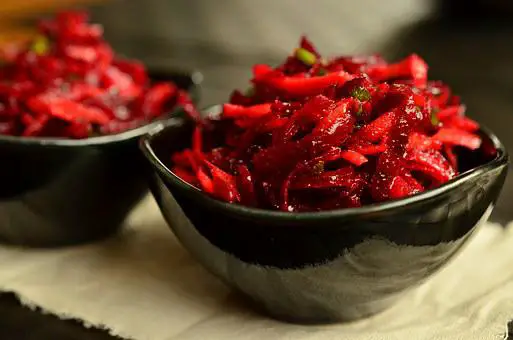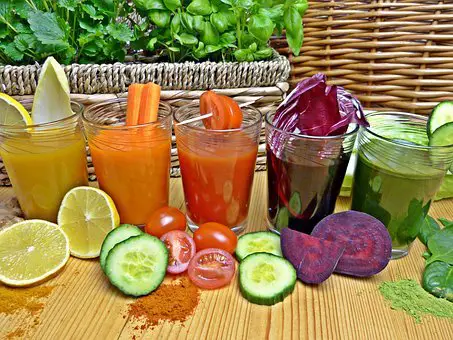Due to their high FODMAP content, people on a low-FODMAP diet should avoid eating beets. Even though it’s okay to eat a small number of beets, it can be hard to limit yourself to that amount.
Therefore, you should introduce new foods to your diet gradually. On a low FODMAP diet, you should limit your consumption of beets because they are one of the vegetables with high FODMAP content.
However, if you can consume beets, there are numerous health benefits. For example, beets are rich in folate, potassium, manganese, and fiber.
Beets
Beets, also known as beetroot, have an earthy flavor that complements salads and other foods. Even cakes can be made with these ingredients. These vegetables are also rich in nutrients that are beneficial to health.
People believe that if included in a healthy diet, they can help reduce blood pressure and even fight cancer.
During the elimination phase of a low FODMAP diet, giving up root vegetables like beets can be challenging. They are typically sweet and high in carbohydrates, but they are so nutritious that it would be foolish not to consume them.
Beetroot contains oligos, which are chains of sugar, and beetroot is rich in oligos, which makes it an unhealthy food. Because beetroot contains a great deal of these natural sugars, it is a high FODMAP food.
You can include beetroot in your diet if you limit your caloric intake.
Recommended Portion
Four slices constitute a traditional serving of beetroot, which is considered high in FODMAPs. If you want to eat beetroot, you need to cut down on the amount you eat to make it low in FODMAP.
Just consume two pieces of approximately 20 grams each, and you’ll be fine.
Health Benefits of Beets
Only 37 calories are contained in a 12-cup serving of beets. These calories are primarily derived from sugar and fiber, which are both forms of carbohydrates.
Due to their low sugar content, beets can aid in weight loss.
Folate is one of the nutrients present in abundance in beets. This micronutrient, also known as vitamin B9, is essential for the production of red blood cells. Additionally, it reduces the likelihood of brain and spine birth defects.
Numerous beneficial plant compounds in beets reduce inflammation and protect cells from damage. Additionally, beets are healthy in the following ways:
- Increase your endurance.
Beetroot and its juice improve heart and lung function during exercise. Beets produce nitric oxide, which increases blood flow to the muscles. Some athletes consume beets or beet juice while exercising to improve their performance.
- Stopping heart attacks and strokes
Folate (vitamin B9), which is abundant in beets, promotes cell growth and function. Folate is needed to keep blood vessels from getting damaged, which lowers the risk of heart disease and stroke.
- Blood Pressure Control
The body converts the nitrates found in beets into nitric oxide. This substance reduces blood pressure by relaxing and widening blood vessels.
- Improve your immune system.
Beets are high in fiber and promote the growth of beneficial bacteria in the digestive tract. Beneficial bacteria in your digestive system can help prevent illness and strengthen your immune system. Fiber helps the body break down food and also helps digestion and keeps you from getting constipated.
Nutrition
Folate, a vitamin that maintains healthy blood vessels, and potassium, a mineral that maintains a healthy heart, are both present in beets.
What to do With Beets
Beetroot is one of those vegetables that people either love or hate due to its difficulty in preparation. There is no need for concern because we have some ideas.
Salad

Cooked and cooled beets have a natural sweetness that is balanced by their earthy flavor. As a result, it’s ideal for salads. To make your salad last longer, grate your small amount of beetroot and combine it with the remaining salad ingredients.
Additionally, you can cut it into small cubes and use them as a delicious garnish.
Dips
You can use the dip as a sauce, as a dipping sauce for your favorite dipping vegetables, or as a meat or fish marinade.
Cake
Historically, beets were included in the classic recipe for red velvet cake. Unfortunately, red food coloring is more popular now, but beets can be used to make a naturally moist and delicious traditional cake.
Omelet
If you add grated beetroot to your omelets, you will have a nutritious and beneficial lunch. To add a little flavor, include some bacon. There is nothing more satisfying than a lunch of bacon and beetroot omelets.
Beets Products
Fresh Beet
A full serving of fresh beetroot, which is four slices, is high in FODMAPs because it has a lot of oligo-fructans, which are short-chain carbohydrates that feed gut bacteria and may cause gastrointestinal distress.
A half serving of fresh beetroot, which is 34 ounces or two slices, is low in oligo-fructans, making it FODMAP-friendly (FODMAPs).
Cooked Beets
Two slices or one-half of a cooked beetroot are low in FODMAPs (34.4 oz.). Even though more research needs to be done to figure out why cooked beetroot is safe, Monash University thinks that the high temperature helps break down FODMAPs.
Beetroot Pickle
Likewise, 12 cups of pickled beets contain a few FODMAPs. Because the fructans in the beetroot leach into the vinegar solution, the acidic environment, and long pickling process, which is similar to how beets are canned, lower the FODMAP content.
Hummus Made With Beets
This can’t be said easily. If you include garlic and onion in the hummus, it will become high in FODMAP. The optimal course of action is to prepare your beet hummus.
Beet Juice

Beet juice has a low FODMAP content when it is drunk in small amounts and not mixed with other drinks.
Determine if there are any additional ingredients. This is crucial because beet juice typically contains apple juice, which is high in FODMAPs.
Beets Powder
Due to the high concentration of beetroot powder, it contains a significant amount of FODMAPs. As a natural food coloring, a pinch of beetroot powder is acceptable.
Beets Packaged in a Can
Even better, a serving size of 12 cups of canned beetroot has a low FODMAP count, while a serving size of 1 cup has a medium FODMAP count and should be consumed with caution.
Preserving and canning food in acidic conditions drastically alters the FODMAP content of the food. Due to this, the water-soluble FODMAPs in the beetroot leach into the brine, so they should never be used.
Final Thoughts
Since they are high in FODMAPs, you should avoid eating beets if you are following a low FODMAP diet. On the other hand, some people may be able to eat small amounts of beets, which means you can add them to your diet.
Unpleasant IBS symptoms can be avoided by moving slowly.
As a nutrient-dense food, beets are beneficial to your health and can help prevent you from becoming ill. If your digestive system can handle this root vegetable, even in small amounts, it could be a healthy addition to your diet.
7